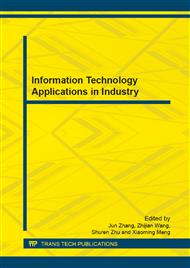p.1442
p.1447
p.1453
p.1457
p.1461
p.1467
p.1473
p.1478
p.1482
Research on Dynamic Authorization Access Control Strategy Model of Distributed Multi-Organization MIS
Abstract:
Focus on the problem of dynamic authorization access control of Distributed Multi-Organization Management Information System (DMOMIS), the system resources are divided into two kinds: relatively independent resources and shared resources. These two kinds of resources were used different authorization system to authorize. The relatively independent resources were authorized by using distributed authorization system (DA), and the similar and shared resources were authorized by using authorized system (A). According to the key terms definition, the system hypothesis and the idea of dynamic programming, then the dynamic authorization access control process of DMOMIS was abstracted as a multi stage users authorization process based on resources, and put out the dynamic authorization access control strategy model of DMOMIS, at last, depicted its execution process.
Info:
Periodical:
Pages:
1461-1466
Citation:
Online since:
December 2012
Authors:
Keywords:
Price:
Сopyright:
© 2013 Trans Tech Publications Ltd. All Rights Reserved
Share:
Citation:


